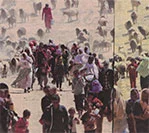Here is the sales pitch: A return to a utopian caliphate in which one brand -and one brand, only of religion would reign supreme, redressing society of all its ills and misbeliefs. Here is the fine print: There would be casualties along the way but these would be necessary for a righteous, puritan society that would live by the word of God, as interpreted by the administrative caliphate. Those felled in the fields of battle fighting for the Truth would be martyrs rewarded in the afterlife.
Here is the misrepresentation: Far from the vision of an ideal Islamic state governed by wisdom, justice, and equity, paradise lost is instead turning out to be a quagmire of tribalism, factionalism, and sectarianism that will for generations to come be riven by cycles of violence and retribution. Innocent men, women, and children are maimed and massacred in violation of the laws of armed conflict laid down in Islam long before the Geneva Conventions. Religious property is destroyed in the name of God against His very commandments. And family homes are marked to discriminate although there should be no compulsion in religion.
There is, in fact, something rotten about the Islamic state propagated by the self-professed Islamic State (IS).
Yet, many from here and all over are being lured to fight in Syria, Iraq, and wherever else IS has ambitions. It is disturbing enough that this is happening again in long shadows of Afghanistan. But even more disconcerting is the prospect of Malaysian fighters returning with a combustible combination of extreme ideology, grisly experience, and a ready, domestic pool of gullible wannabes.
Prevention requires a comprehensive multi-pronged with an assortment of shorterm tactics and longer-term strategies. These range from intelligence and law enforcement initiatives to leveraging technology and changing, mindsets.
The latter demands difficult nation-building decisions -depoliticising faith, ethnicity, and religion; transforming an education system that promotes critical thought, reason, and discernment; upholding good governance practices and the rule of law; as well as crucially, the political will to see it all through.
What we can do, in the meantime, is be more mindful of the words we use and the references we make.
In particular, calling these fighters -many of whom defile the sanctity of Islam by their actions ”jihadists” or “jihadis” is a mistake.
“Jihad”, which traditionally means to struggle for betterment and in the path of God, has positive connotations. To add an English suffix to an Arabic word means nothing, at the very least. Sure, it makes a convenient, short-hand reference but it also ends up negating the affirmative understanding of “jihad” and pigeon-holing it with violence and mayhem.
More than that, it effectively legitimises these fighters and their cause while alienating the majority of Muslims who disassociate from, and condemn, the creed and brutality of IS.
It affirms the binary worldview of “us” and “them” among these extremists so that all those not seen supporting IS are insufficiently Islamic or disbelieving infidels.
Precariously, tying these fighters to “jihad” shifts the debate about IS to dangerous theological grounds so that discussion concerning the movement is no longer about crime, barbarism, or terrorism but about whether it is religiously permissible to commit such acts.
It is by far better to call a spade, a spade. There is no such thing as a spade-ist, after all. It also makes better sense to sever any emotion tied to the cause or actions of these fighters rather than to accord them any honour or heroism. At best, they are simply fighters. At worst, they are terrorists judging by their actions.Regardless of what one may think of the Assad regime or Shiites, the fighting in Syria and Iraq involving direct parties and their proxies is not ours and is not about religion. It is instead about politics, and the balance of power and influence in that region. So, while IS may invoke the language of religion, they certainly by no means speak for Islam or the millions of other Muslims who strongly denounce what they stand for. We should not provide them the platform to do so, even if only by words.
Article by Elina Noor which appeared in New Straits Times, 19 August 2014.





